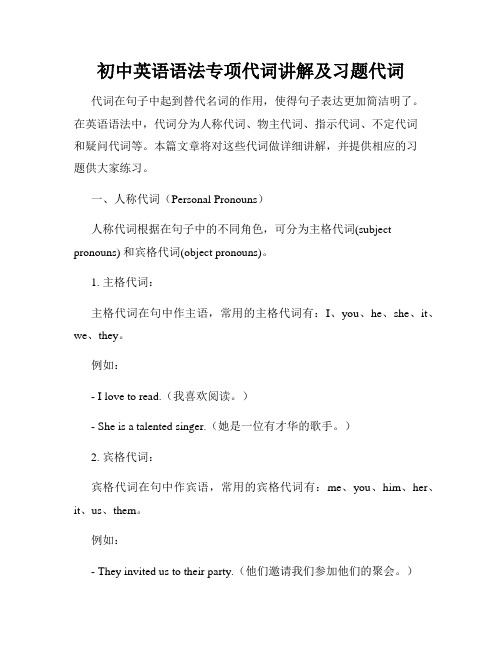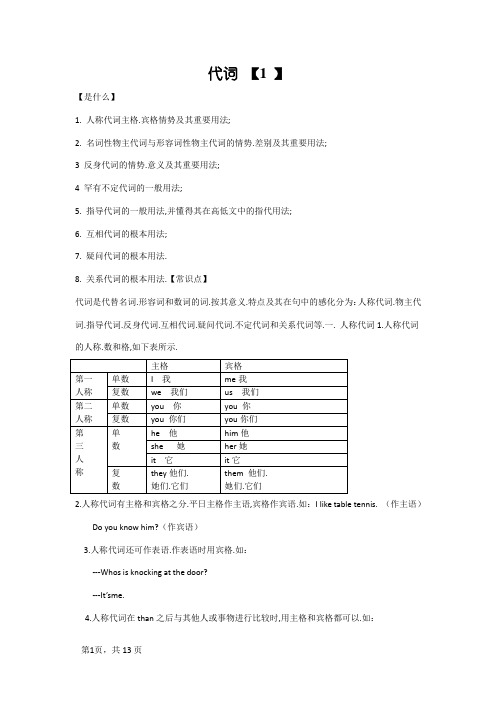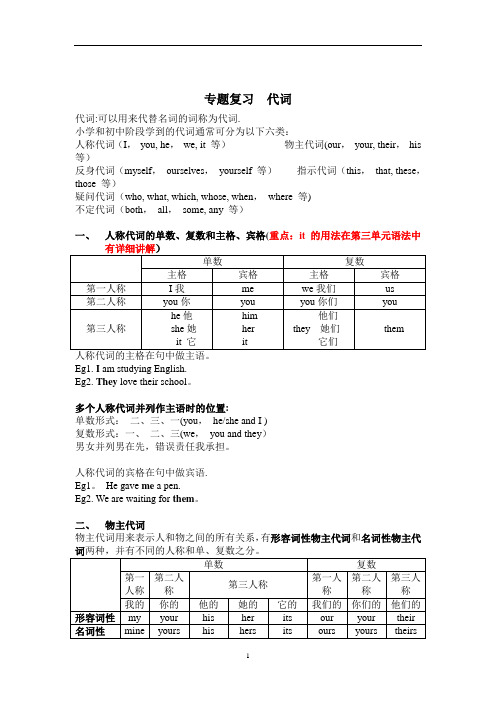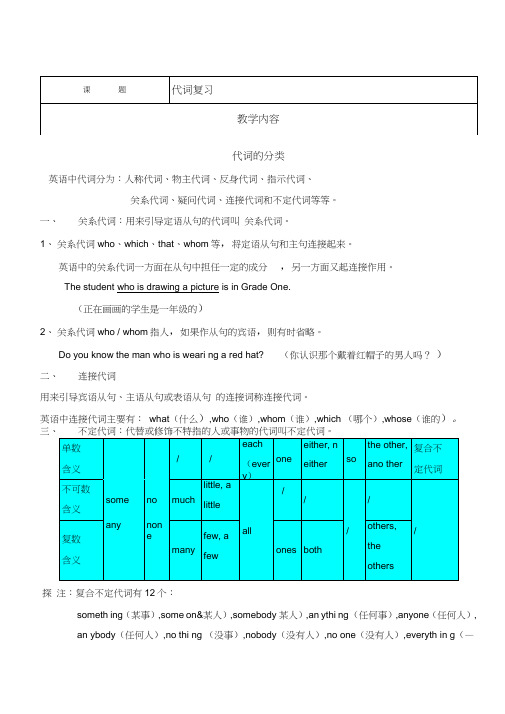【初中英语】 代词专项讲解及练习(1)
初中英语语法专项代词讲解及习题代词

初中英语语法专项代词讲解及习题代词代词在句子中起到替代名词的作用,使得句子表达更加简洁明了。
在英语语法中,代词分为人称代词、物主代词、指示代词、不定代词和疑问代词等。
本篇文章将对这些代词做详细讲解,并提供相应的习题供大家练习。
一、人称代词(Personal Pronouns)人称代词根据在句子中的不同角色,可分为主格代词(subject pronouns) 和宾格代词(object pronouns)。
1. 主格代词:主格代词在句中作主语,常用的主格代词有:I、you、he、she、it、we、they。
例如:- I love to read.(我喜欢阅读。
)- She is a talented singer.(她是一位有才华的歌手。
)2. 宾格代词:宾格代词在句中作宾语,常用的宾格代词有:me、you、him、her、it、us、them。
例如:- They invited us to their party.(他们邀请我们参加他们的聚会。
)- Could you help me with my homework?(你能帮我做作业吗?)二、物主代词(Possessive Pronouns)物主代词用来表示所属关系,常用的物主代词有:mine、yours、his、hers、its、ours、theirs。
例如:- The red pen is mine.(这支红笔是我的。
)- Is this book yours?(这本书是你的吗?)三、指示代词(Demonstrative Pronouns)指示代词用来指代特定的人或物,常用的指示代词有:this、that、these、those。
例如:- This is my new car.(这是我的新车。
)- Those are her paintings.(那些是她的画作。
)四、不定代词(Indefinite Pronouns)不定代词用来指代不确定的人或物,常用的不定代词有:somebody、anybody、nobody、everybody、something、anything、nothing、everything等。
初中英语代词讲解及练习

代词【1 】【是什么】1. 人称代词主格.宾格情势及其重要用法;2. 名词性物主代词与形容词性物主代词的情势.差别及其重要用法;3 反身代词的情势.意义及其重要用法;4 罕有不定代词的一般用法;5. 指导代词的一般用法,并懂得其在高低文中的指代用法;6. 互相代词的根本用法;7. 疑问代词的根本用法.8. 关系代词的根本用法.【常识点】代词是代替名词.形容词和数词的词.按其意义.特点及其在句中的感化分为:人称代词.物主代词.指导代词.反身代词.互相代词.疑问代词.不定代词和关系代词等.一. 人称代词1.人称代词的人称.数和格,如下表所示.2.人称代词有主格和宾格之分.平日主格作主语,宾格作宾语.如:I like table tennis. (作主语)Do you know him?(作宾语)3.人称代词还可作表语.作表语时用宾格.如:---Whos is knocking at the door?---It’sme.4.人称代词在than之后与其他人或事物进行比较时,用主格和宾格都可以.如:He is older than me.He is older than I am.二. 物主代词1.暗示所有关系的代词叫物主代词.物主代词分形容词性物主代词和名词性物主代词,如下表所示.2. 形容词性物主代词的感化相当于形容词,可在句中作定语.例如:Our teacher is coming to see us. This is her pencil-box.3. 名词性物主代词的感化相当于名词,在句中可用作主语.宾语和表语. Our school is here, and theirs is there.(作主语)--- Is this English-book yours? (作表语)--- No. Mine is in my bag. I've already finished my homework. Have you finished yours? (作宾语)三. 指导代词指导代词包含:this,that,these,those.1. this和these一般用来指在时光或空间上较近的事物某人,that和those则指时光和空间上较远的事物某人,例如:This is a pen and that is a pencil.We are busy these days.In those days the workers had a hard time.2. 有时that和those指前面讲到过的事物,this 和these则是指下面将要讲到的事物,例如:I had a cold. That's why I didn't come. What I want to say is this ;pronunciation is very important in learning English.3. 有时为了防止反复提到的名词,常可用that或those代替,例如:Television sets made in Beijing are just as good as those made in Shanghai.4. this 在德律风用语中代表本身,that 则代表对方.例如:Hello! This is Mary. Is that Jack speaking?四. 反身代词英语顶用来暗示"我本身","你本身","他本身","我们本身","你们本身"等意义的代词称为反身代词,也有人称之为自身代名词,其情势如表所示.反身代词可以在句中作宾语,表语,同位语.1. 作宾语,暗示动作的推却者就是动作的发出者,主语和宾语指统一小我或一些人. He called himself a writer.Would you please express yourself in English?2. 作表语. It doesn't matter.I'll be myself soon.The girl in the news is myself.3. 作主语或宾语的同位语,暗示亲自或本身. I myself washed the clothes.(=I washed the clothes myself.)(作主语同位语)You should ask the teacher himself.(作宾语同位语)五. 不定代词不是指明代替任何特命名词的代词叫做不定代词,在句中可作主语.表语.宾语和定语.现将几个经常应用的不定代词举例解释如下:1. some与any的差别1)some多用于确定句,暗示“一些,几个”作形容词时,后面可以接①不成数名词+单数动词;②可数名词+复数动词.Look! Some of the students are cleaning the library.. Some rice in the bag has been sold out.2)any多用于疑问句.前提句和否认句中,暗示“一些,任何”用作形容词时,后面可以接①不成数名词+单数动词;②可数名词+复数动词.If you have any questions, please ask me.There isn't any orange in the bottle.Have you got any tea?3)any和some也可以作代词用,暗示“一些”.any多用于疑问句或否认句中,some多用于确定句中.How many people can you see in the picture?I can't see any.If you have no money, I'll lend you some.留意:与some, any联合的词如something, somebody, someone, anything, anyone, anybody在确定句.否认句.疑问句.前提句中的用法,大致和some, any的用法雷同.2. few, a few, little, a little在用法上的差别1)用作形容词:I'm going to buy a few apples.He can speak only a little Chinese.There is only a little milk in the glass.He has few friends.They had little money with them.2)a little和little也可以用作副词,a little暗示“有点,稍微”,little暗示“很少”.I'm a little hungry. (润饰形容词hungry)Let him sleep a little. (润饰动词sleep)Mary, go a little faster, please. (润饰副词比较级)She slept very little last night.3. other, the other, another, others, the others的差别.1)other可以作形容词用,后面可以跟单数或复数名词,意思是“其他的.别的”.Where are his other books?I haven't any other books except this one.2)other也可以用作代词,与冠词the连用组成“the other”,暗示两小我或物中的“另一个”.常与one搭配组成“one ..., the other ...”句型.He has two brothers. One is 10 years old , the other is 5 years old.She held a ruler in one hand and an exercise-book in the other.3)other作代词用时,可以有复数“others”,泛指“别的的人或物”.常与some搭配组成“some ...., others ...”句型.Some went to the cinema, others went swimming.This coat is too large. Show me some others, please.4)“the others”暗示特指某规模内的“其他的人或物”.We got home by 4 o'clock, but the others didn't get back until 8 o'clock.In our class only Tom is English, the others are Chinese.5)another可以作形容词用,润饰后面的名词,意为“另一个”,还可以跟代词one.You can see another ship in the sea, can't you?Mary doesn't want to buy this skirt. Would you please show her another one?6)another也可以作代词用,暗示“另一个”.I'm still hungry after I've had this cake. Please give me another.4. every与each的差别.The teacher gave a toy to each child.Each ball has a different colour.当我们说each child, each student或each teacher时,我们想到的是一小我的情形.而当我们说every child和every student时,我们想到的是全部的情形,every的意思与all接近,暗示他们都如斯.Every student loves the English teacher. = All students love the English teacher.Every child likes playing. = All children like playing.5. all和both的用法.1)all指三者以上,或不成数的器械.谓语动词既可以用单数,也可以用作复数.在句中作主语.表语.宾语.同位语和定语.All of us like Mr Pope. 我们都爱好Pope师长教师.(作主语)= We all like Mr Pope. (作同位语)All the water has been used up. (作主语)That's all for today. (作表语)Why not eat all (of) the fish? (作宾语)All the leaders are here. (作定语)2)both作代词.①与其他名词或代词并列消失,暗示“两个都”.Lucy and Lily both agree with us.They both passed on their sticks at the same time.How are your parents? They're both fine.②与“o f +代词(或名词)”连用,暗示“两者都”.Both of them came to see Mary.Both of the books are very interesting.③单独应用,暗示“两者(都)”.Michael has two sons. Both are clever.I don't know which book is the better, I shall read both.3)both用作形容词,放在名词之前,润饰该名词,暗示“两者都”.Both his younger sisters are our classmates.. There are tall trees on both sides of the street.六. 互相代词暗示互相关系的代词叫做互相代词.互相代词有each other 和one another两种情势.在当代英语中,each other和one another没有什么差别.互相代词可在句中作宾语,定语.作定语用时,互相代词用所有格情势. We should learn from each other / one another. (作宾语)Do you often write to each other / one another? (作宾语)We often borrow each other's / one another's books. (作定语)The students corrected each other's / one another's mistakes in their homework.(作定语)七. 疑问代词疑问代词有who,whom,whose,what和which等.疑问代词用于特别疑问句中,一般都放在句首,并在句子中作为某一句子成分.例如:Who is going to come here tomorrow? (作主语)What is that? (作表语)Whose umbrella is this? (作定语)Whom are you waiting for? (作宾语)关系代词是一种引诱从句并起衔接主句和从句感化的代词.关系代词有who, whose, whom, that, which. 它们在句中可用作主语,表语,宾语,定语. 在主句中,它们还代表着从句所润饰的谁人名词或代词.例如:I hate people who talk much but do little.I’m looking at the photograph which you sent me with your letter.With the money that he had saved, he went on with his studies.Do you know the lady who is interviewing our headmaster?【实例解析】1. (2004年北京市中测验题)Mary, please show ________ your picture.A. myB. mineC. ID. me答案:D.该提考核的是人称代词和物主代词的用法.在本题中,动词show的后面要跟双宾语,空白处缺乏一个间接宾语,所以应选me.2. (2004年北京市中测验题)---What’s on TV tonight? Is there _________ interesting?---I’m afraid not.A. somethingB. anythingC. nothingD. everything答案:B.该提考核的是不定代词的用法.这是一个疑问句.在疑问句中,通经常应用anything.3. (2004年上海徐汇区中测验题)________ of them has his own opinion.A. BothB. SomeC. EveryD. Each答案:D.该题考核的是不定代词用法.因为谓语动词是单数情势,所以Both和Some都不合错误.Every 不克不及作主语,所以只有Each适合.4. (2004年安徽省中测验题)---Where is my pen?---Oh, sorry. I have taken _______ by mistake.A. yoursB. hisC. mineD. hers答案:A.该题考核的是物主代词的用法.依据题干的布景,我们可以断定出错拿的钢笔应当是对方的,所以选yours.【中考练习训练】一. 单项填空1. Tom, Please pass ________ the glasses. I want to read the newspapers.A. youB. meC. himD. her2. The English novel is quite easy for you. There are ______ new words in it.A. a littleB. littleC. a fewD. few3. ---You want ________ sandwich?---Yes, I usually eat a lot when I’m hungry.A. otherB. anotherC. othersD. the other4. The doctors and nurses are doing their best to fight SARS. They think more of others than _______.A. theyB. themC. themselvesD. theirs5. ---Which do you prefer, a bottle of orange or a bottle of milk?---______________, thanks. I’d like a cup of tea.A. EitherB. NeitherC. BothD. None6. ---Oh! I came in a hurry and forgot to bring food.---Never mind. You can have ________.A. usB. oursC. youD. yours7. ---Can I come this evening or tomorrow morning?---_______ is OK. I’m free today and tomorrow.A. EitherB. NeitherC. BothD. None8. ---How are you going to improve _______ this term?---Work harder than last term.A. ourselvesB. myselfC. himselfD. yourself9. ---Could you tell me _______ she is looking for?---Her cousin, Susan.A. thatB. whoseC. whoD. which10. ---Is _______ here?---No. Li Lei and Han Mei have asked for leave.A. everybodyB. somebodyC. anybodyD. nobody11. Paul has _______ friends except me, and sometimes he feels lonely.A. manyB. someC. fewD. more12. If you want to book a round-trip ticket, you’ll have to pay ______ $ 30.A. moreB. otherC. the otherD. another13. ---Do you live by yourself, Mr Wang?---Yes. I have two sons. But ______ of them lives with me. They are now studying in America?A. neitherB. bothC. noneD. either14. ---Have you sent your parents an E-mail telling them you arrived safe?---No. _______ of them can use a computer.A. NoneB. BothC. NeitherD. All15. Who taught _______ English last term? Was _____ Mr. Smith?A. you; itB. you; heC. your; itD. your; that16. ---That wom an has a bag in her right hand. What’s in her _____ hand?A. anotherB. otherC. oneD. the other17. We decided to go for a field trip with some friends of _______.A. usB. ourC. oursD. ourselves18. ---Is there a bus to the zoo?---I’m afraid there’s _______ bus to the zoo.A. noB. anyC. someD. none19. You forgot your dictionary? You may have _______.A. meB. myC. mineD. myself20. This is ______ classroom. Where is _______?A. our; themB. us; theyC. our; theirsD. ours; theirs二. 用所给代词的恰当情势填空1. This is not my pencil-box. _______ ( I ) is in the bag.2. Trees are planted in ______ ( we ) country every year, which makes our country more and more beautiful.3. ---Is that bike Miss Gao’s?---Yes, it is ______(she) . Beautiful, isn’t it?4. Help ______ (you) to some fruit, Jack.5. ---Who taught your brother to surf?---Nobody. He learnt all by _______ (he).6. Their English teacher is from America, but ______ (we) is from England.7. Mary’s answer is different from ________ ( I ).8. ---My watch keeps good time. What about _______(you)?---Mine? Oh, two minutes slow.9. Sam is my brother. Do you like to play with ______ (he)?10. Did you enjoy _______ (you), Mary and Kate?三. 用恰当的代词填空1. The old man has two sons. One is a worker, _______ is a teacher.2. Students are usually interested in sports. Some like running; some like swimming; _______ like ball games.3. Let’s go and have a drink. We’ve got _______ time before the train leaves.4. We were all very tired, but _______ of us would like to have a rest.5. ______ of the twins are in our class.6. Boys, don’t touch the machines, or you may hurt _______.7. It is said there is going to be ________ important in the CCTV news.8. We couldn’t buy anything because _______ of the shops opened at that time.9. They didn’t learn _______ new in this lesson.10. ---Why is ______ easy for such a young girl to learn three foreign languages so well?---Because Britain, Germany and France are all very near ______ country.四. 用恰当的疑问代词和关系代词填空1. ______ is the population of the world today?2. _______ jumped the longest of all in the long jump?3. --- _______ colour is your mother’s dress?---It’s black.4. ---______ is your car?---The red one in front of the tree.5. ---______ of the following can you often find on a medicine bottle?---I know, sir. It’s instruction.6. The necklace ______ she is wearing is beautiful.7. Do you know the person _______ lost his bike?8. Most people _______ live in less developed countries are quite poor.9. The boy ______ is helping the old man is John’s brother.10. People ______ use credit cards to buy things online should be very careful【演习答案】三. 1..the other 2.others 3.a little 4. none 5.Both 6.yourselves 7.something 8.none 9.anything10.it; her四. 1. What 2. Who 3. What 4. Which 5. Which 6. that/ which 7. that/ who 8. who/that 9. who/that 10. who/ that。
初中英语语法---代词专题(含练习)

专题复习代词代词:可以用来代替名词的词称为代词.小学和初中阶段学到的代词通常可分为以下六类:人称代词(I,you, he,we, it 等)物主代词(our,your, their,his 等)反身代词(myself,ourselves,yourself 等)指示代词(this,that, these,those 等)疑问代词(who, what, which, whose, when,where 等)不定代词(both,all,some, any 等)一、人称代词的单数、复数和主格、宾格(重点:it的用法在第三单元语法中Eg1. I am studying English.Eg2. They love their school。
多个人称代词并列作主语时的位置:单数形式:二、三、一(you,he/she and I )复数形式:一、二、三(we,you and they)男女并列男在先,错误责任我承担。
人称代词的宾格在句中做宾语.Eg1。
He gave me a pen.Eg2. We are waiting for them。
二、物主代词物主代词用来表示人和物之间的所有关系,有形容词性物主代词和名词性物主代形容词性物主代词不能单独使用,只做定语,用来修饰其后的名词。
Eg1。
My parents are both doctors.Eg2。
There’s something wrong with his bike.名词性物主代词应独立使用,后面不跟名词,相当于形容词性物主代词+名词,在句中可以作主语、宾语或标语.Eg1. Our classroom is on the second floor,and theirs is on the fourth floor. (作主语) Eg2。
Let's clean their room first, and then clean ours. (作宾语)Eg3。
初中英语代词讲解与专项练习

初中英语语法代词专项练习三、指示代词(可起名词的作用,在句中作主语、宾语、表语,也可以当形容词用,在句中可作定语)this 这,这个;that 那,那个;these 这些;those 那些。
五、疑问代词(表示疑问,一般放在句首,构成特殊疑问句。
疑问代词有:who、whom、whose、what、which)六、不定代词用来不指明任何特定的人和物。
不定代词有:some,many,no,any,both,all,every,each,either,neither,another,other(s),much,none ,few,a few ,little ,a little等复合不定代词:something,anything,nothing等不定代词的用法。
1,some和any既可以修饰可数名词的复数,也可以修饰不可数名词。
Some多用于肯定句中,any则多用于否定句,疑问句和条件句中。
2,no表否定,相当于not a 或not any3,当形容词修饰不定代词时,应位于不定代词之后。
(1)按要求写出下列代词的形式1、I(宾格)________2、he(形容词性物主代词)________3、us(主格)________4、they(宾格)________5、she(宾格)________6、you(名词性物主代词)________7、it(宾格)________ 8、my(复数)________9、him(复数)________ 10、he(形容词性物主代词)________11、we(单数)________ 12、they(名词性物主代词)________13、I(反身代词)________ 14、you(反身代词)________15、she(反身代词)________ 16、he(反身代词)________17、it(反身代词)________ 18、I(反身代词)________(2)选出括号中正确的词,在正确的词上打勾。
初中英语代词讲解与练习

初中英语代词讲解与练习1、在定语从句中,领先行词是代词he / she / those / anyone等时,从句的引导词指人时用who, 指物时用that。
e.g. Those who know the answer can go on with the other exercises.He who does not reach the Great Wall is not a true man.Anything that benefits the people will be accepted.2、all ( both, every, each)……not = not all ( both, every, each) 构成局部否认,他们的全部否认区分是:none, neither, no one ( nothing)e.g. Not all the students could understand his explanation.Each child can not go to school in the mountain village.3、含有else的一切格有以下几种表示法:somebody else’s, anybody else’s, nobody else’s ; who else’s = whose else4、不定代词作主语,代词可用:it〔指物〕、he〔指人〕、they〔指人、物〕e.g. Everyone knows how to do it, doesn’t he/ don’t they?4、all 作主语时的数:替代可数名词,是双数;替代不可数名词,是双数;作〝所…的一切〞解释时,不可数,动词用双数。
5、反身代词:by oneself: 亲身、独自、自动地;of oneself: 自动地;be oneself: 身体好help oneself (to…): 自助、自己拿……;in itself: 实质上、就其自身而言。
初中英语代词用法全解及练习含问题详解

实用文档文案大全人称代词顺口溜:人称代词有两类,一类主格一类宾;主格代词本领大,一切动作由它发;宾格代词不动脑,介动之后跟着跑。
物主代词顺口溜:物主代词不示弱,带着‘白勺'来捣乱;形容词性物主代,抓住名词人称代词的用法人称代词的主格在句子中作主语或主语补语。
一般在句首,动词前。
例如:John waited a while but eventually he went home. 约翰等了一会儿,最后他回家了。
John hoped the passenger would be Mary and indeed it was she. 约翰希望那位乘客是玛丽,还真是她。
说明:在复合句中,如果主句和从句主语相同,代词主语要用在从句中,名词主语用在主句中。
在电话用语中常用主格。
例如:When he arrived, John went straight to the bank. 约翰一到就直接去银行了。
I wish to speak to Mary. This is she. 我想和玛丽通话,我就是玛丽。
人称代词的宾格在句中作宾语或表语,在动词或介词后。
例如:Do you know him?(作宾语) 你认识他吗?Who is knocking at the door?It's me. (作表语) 是谁在敲门?是我。
说明:单独使用的人称代词通常用宾格,即使它代表主语时也是如此。
例如: I like English. Me too.我喜欢英语。
我也喜欢。
注意:在动词be 或to be 后的人称代词视其前面的名词或代词而定。
例如:I thought it was she.我以为是她。
(主格----主格) I thought it to be her.(宾格----宾格) I was taken to be she.我被当成了她。
(主格----主格) They took me to be her.他们把我当成了她。
初中中考英语代词专项讲解和练习

初中英语中考代词专项代词的分类:人称代词、物主代词、反身代词、指示代词、关系代词、疑问代词、连接代词和不定代词等1. 人称代词,物主代词,反身代词2. 指示代词:指示说明近处或者远处、上文或者下文、以前或者现在的人或事物;Remember never to do ________ things.---Hello, this is Tommy. Who is _____ ----______ is me3. 疑问代词的一般用法A. 关于who与whomWho通常用作主语, whom用作宾语, who可对主语或宾语提问, 而whom只能对宾语提问. 在口语中常用who来替代whom, 但如果用于介词之后,则只能用whom.B. 关于what与 whichw hat”什么” which哪一个前者问的宽泛, 后者问得具体, 有明显限定性的选择范围.C. 疑问代词不分单复数,视它所替代的人或事物决定单复数,但是通常用单数;如果修饰名词,则以名词的单复数为准;4. it的特殊用法A. It’s + adj. + to do该句型中的形容词表示不定式所具备的特征或客观情况, 其中it为形式主语, to do sth.为真实主语B. It’s + adj. + for sb. + to do sth.该句型中的形容词指的是do sth.的属性. 不能改成sb. Is/are + adj.的结构C. It’s + adj. + of sb. + to do sth.该句型中的形容词跟人有关,用来描述人的特征、品质等;表示“某人这么做真是太----了”5. 不定代词:代替或修饰不特指的人或事物的代词叫不定代词;常用的不定代词有:all, each, neither; one, none, little, few, many, much, others, another, some, any, no及some, no, any, every与其他词组成的复合结构.A. some和 any 的用法:some一般用于肯定句中作定语时可修饰可数名词或不可数名词; 用于疑问句时,表示建议、请求或希望得到肯定回答;any 一般用于疑问句或否定句中作定语时可修饰可数或不可数名词; any 用于肯定句时,意思是“任何的”;B. no和none的用法:no是形容词,修饰可数n.单数或复数或不可数n.,不可与of连用,谓语动词用______.none既可以指人也可以指物,“一点也不,一个也不”,常与of连用,谓语动词________.C. all和both的用法:all和both既可以修饰名词_______________,也可以独立使用, all指三者或三者以上的人或物, both指两个人或物D. every和each用法:every是形容词,只能作定语修饰单数名词,意思是”每一个”, 谓语动词用_________.each是形容词、代词“每个/各个”,表示单个概念;each可以放在名词前,可以后跟of短语,谓语动词用_________.E. either和neither的用法:either意思是“两个中间的任何一个”;neither是either的否定形式,意思是“两个都不”;F. other, the other, another, others, the others的用法:other表示泛指,“另外的,其他的”常与复数名词或不可数名词连用the other特指两个中的另一个;可单独使用也可接单数名词the others=_________________another常用于指三者或三者以上中的另一个,泛指单数;可单独使用也可后接名词;如果其后接复数名词,表示“又,再,还”others指“剩余的人/物”指大部分You have had several cakes. Do you really want ________ oneI want _______ four books.This is one of your socks. Where is _________A few students are playing soccer while ________ are watching them.Two of the ten boys are standing and __________ are sitting round them.I have no _________ place to go for a holiday.G .many和much的用法:many意思是“很多”,与可数名词复数连用;too manymuch意思是“很多”,与不可数名词连用; too muchH. few、little、a few、a little的用法:few、little意思是“很少几个”、“几乎没有”,有否定的意思,a few、a little意思是“有几个”、“有些”,有肯定的意思 ,few、a few与可数名词连用或代替可数的事物,little、a little与不可数名词连用或代替不可数的事物;He is very poor and he has _________ money.Don’t worry. There is still ________ time left.It’s very difficult, but ________ people can understand it.I. 复合不定代词somebody, something, anything, nothing, everything,everybody等是由some, any, no, every, 加上body, thing构成的,叫做复合不定代词,在句子中当单数使用.somebody, something, someone 一般用于肯定句中,anything, anybody, anyone一般用于疑问句、否定句和条件状语从句中;修饰复合不定代词的定语,应放在它们的后面;J. one与ones用来代替上文的一个或多个人或事物, 前面可以加冠词, 形容词, 指示代词, which等.K. one与it的区别One指代上文提到同类事物中的一个, 但不是上文提到的那一个. 如果指同类事物中的一些,用ones. It可指代动物或物生命的事物及时间, 日期, 天气, 距离等, it也可作形式主语或形式宾语L. so可以代替一件事情, 作句子的宾语或表语;我认为不是这样的. ______________________.He lost a book. __________. 我也是;M. none、no one、nobody的区别:no one和nobody都表示”没有人”, 仅指人,后面不跟of 短语, 作主语时谓语用______.none表示”没有一个人/物”, 可指人也可以指物,后面可跟of短语, 作主语时谓语______.随堂练习Practice makes perfect1. In our school, ___ students like English, but ___ of them can speakEnglish smoothly.A. a little; a fewB. a few; fewC. a few, littleD. a little; few2. —Which of the two magazines will you take—I’ll take______ though I find ______ of them are very useful to me.A. all; bothB. either; eitherC. either; neitherD. either; both3. —I’m a bit hungry, Auntie—There’re some cakes on the table. You may take ______.A. itB. oneC. thatD. this4. _______ may have a chance to be successful if he tries his best.A. NoneB. NobodyC. SomebodyD. Everybody5. At present, children mean _______ to most of the parents.A. everythingB. nothingC. anythingD. something6. ----Can I come this evening or tomorrow morning---__________ is OK. I’m free today and tomorrow.A. NeitherB. EitherC. BothD. None7. Bob, can you see the boys over there _______ are my cousins. Let’s goand say hello to them.A. ThisB. thoseC. theseD. That8. Bill thought ______ necessary to work with friends and share different ideas.A. theyB. oneC. thatD. it9. I’ve been so bored for a long time. I hope to have ________to do.A. exciting somethingB. nothing excitingC. something excitingD. good something10. ---Would you like some tea or coffee ---______, thanks I’d prefer some coke.A. BothB. NeitherC. EitherD. None11. ----Susan, go and join your sister in cleaning the yard---Why ______ John is sitting there doing nothing at all.A. IB. myselfC. mineD. me12. ---Everyone knows Canada is the second largest country in the world. ---That is, it is larger than __________ country in Asia.A. anyB. any otherC. otherD. another13. He is a man of ______ word.A. a fewB. fewC. a littleD. little14. Televisions have made _______ possible for us to watch movies at home.A. thatB. itC. thisD. one15. ---Could we see each other at 9 o’clock tomorrow morning---Sorry, let’s make it ________ time.A. other’sB. the otherC. otherD. another16. We should tell the truth. We can’t say one thing to one person and______ thing to someone else.A. otherB. anotherC. the otherD. one more17. My host family tried to cook ________ for me when I studied in New York.A. different somethingB. different anythingC. something differentD. anything different18. ---It snowed heavily last night. Is everyone in our class here today ---Yes, and ___________ of us was late for school this morning.A. noneB. nobodyC. allD. others19. Eddie has _________ to do, and he sleeps all day long.A. noneB. anythingC. nothingD. something20. He thinks himself somebody, but we think him ___________.A. noneB. somebodyC. anybodyD. nobody二、完形填空2013江苏泰州What comes to your mind when you talk about donations You probably think of a group of people with __16__ in hand asking people to donate money. But my school came up with a __17__ way of raising funds—Fun Night.Fun Night is like a party. Students pay money to get in and have dinner at school. The __18__ they pay will go towards helping poor children __19__.Two months ago, I took part in Fun Night. There were all kinds of __20__ in Fun Night. The most popular game was the “jousting ring”夺环. I “jousted” with several of my __21__ and managed to knock plenty of them off the ring. __22__, they developed different strategies策略to win, such as starting in a crouched position蹲姿to gather more strength when pushing.Sometimes they attacked me __23__ I was ready. It would usually be __24__ as cheating作弊, but we didn't care and __25__ playing. After all毕竟, it was just a game, not __26__.The best of Fun Night was not the fun activities. The fact was that we raised a lot of money by having a __27__ time. A lot of students at my school wouldn't __28__ money if they were simply asked to hand it over. But this kind of event not only made them __29__ to give, but also allowed them to have a great time playing games with friends. I realized that __30__ can be fun. We raised 2, 000 yuan on that night.16. A. boxes B. books C. schoolbags D. clothes17. A. common B. different C. silly D. realistic18. A. sit B. attention C. stationery D. money19. A. in danger B. in need C. in trouble D. in love20. A. classes B. subjects C. games D. lessons21. A. neighbors B. cousins C. visitors D. friends22. A. However B. Luckily C. Otherwise D. Hopefully23. A. before B. unless C. after D. if24. A. named B. considered C. described D. discovered25. A. finished B. started C. continued D. stopped26. A. a competition B. an opinion C. a research D. an experiment27. A. tiring B. hard C. long D. good28. A. save B. make C. donate D. spend29. A. afraid B. glad C. sorry D. angry30. A. friendship B. knowledge C. charity D. experience。
(完整版)初中英语代词讲解及练习题

代词的分类英语中代词分为:人称代词、物主代词、反身代词、指示代词、关系代词、疑问代词、连接代词和不定代词等等。
一、关系代词:用来引导定语从句的代词叫关系代词。
1、关系代词who、which、that、whom等,将定语从句和主句连接起来。
英语中的关系代词一方面在从句中担任一定的成分,另一方面又起连接作用。
The student who is drawing a picture is in Grade One.(正在画画的学生是一年级的)2、关系代词who / whom指人,如果作从句的宾语,则有时省略。
Do you know the man who is weari ng a red hat? (你认识那个戴着红帽子的男人吗?)二、连接代词用来引导宾语从句、主语从句或表语从句的连接词称连接代词。
英语中连接代词主要有:what(什么),who(谁),whom(谁),which (哪个),whose(谁的)。
三、不定代词:代替或修饰不特指的人或事物的代词叫不定代词。
探注:复合不定代词有12个:someth ing(某事),some on&某人),somebody 某人),an ythi ng (任何事),anyone(任何人), an ybody(任何人),no thi ng (没事),nobody(没有人),no one(没有人),everyth in g(—切), every one(每个人),everybody 每个人).1. some和any的用法:some —般用于肯定句中,意思是几个” 一些”某个”作定语时可修饰可数名词或不可数名词I have some work to do today.(今天我有些事情要做)They will go there some day.(他们有朝一日会去那儿)some用于疑问句时,表示建议、请求或希望得到肯定回答。
Would you like some coffee with sugar?(你要加糖的咖啡吗?)any —般用于疑问句或否定句中,意思是一些”作定语时可修饰可数或不可数名词。
- 1、下载文档前请自行甄别文档内容的完整性,平台不提供额外的编辑、内容补充、找答案等附加服务。
- 2、"仅部分预览"的文档,不可在线预览部分如存在完整性等问题,可反馈申请退款(可完整预览的文档不适用该条件!)。
- 3、如文档侵犯您的权益,请联系客服反馈,我们会尽快为您处理(人工客服工作时间:9:00-18:30)。
必备英语【初中英语】代词专项讲解及练习一、初中英语代词1.The old man is ill and he doesn't feel like ______________.A. to eat somethingB. to eat anythingC. eating somethingD. eating anything【答案】 D【解析】【分析】句意:这位老人病了,他不想吃任何东西。
feel like doing sth想要做某事,固定搭配,something用于肯定句,anything用于否定句和疑问句,这里是否定句,用anything,故答案为D。
【点评】考查固定搭配和不定代词。
注意something用于肯定句,anything用于否定句和疑问句。
2.— It's very cold today.— Yes, the weather is much colder than ________ in my hometown.A. thatB. oneC. it【答案】 A【解析】【分析】句意:——今天非常冷。
——是的,天气比我家乡的天气冷许多。
根据句意可知是今天的天气和家乡的天气比较,weather天气,不可数名词,所以用that代指不可数名词,故选A。
【点评】考查代词辨析,注意平时识记比较时用that代指不可数名词。
3.We should not give up. ________ we do, we must try our best.A. WheneverB. WhereverC. WhateverD. However【答案】 C【解析】【分析】句意:我们不应该放弃。
无论我们做什么,我们都必须尽力。
A 无论什么时候;B 无论那里;C 无论什么;D 无论怎样。
根据题干中的…we do,we must try our best可知此句需要代词,做do的宾语,故选C。
【点评】考查代词whatever的基本含义及用法。
注意区分whenever,wherever,whatever 以及however的不同。
4.The bird can't fly. _____ of its wings were hurt.A. BothB. AllC. EitherD. Neither【答案】 A【解析】【分析】句意:这只鸟不会飞。
它的两个翅膀受伤了。
A.两者都;B.都,三者或者三者以上;C. (两者中)任一的;D.两者都不。
根据常识可知,鸟应该有两个翅膀,故排除B;either of修饰的名词作主语时,谓语动词用单数;both of修饰的名词作主语时,谓语动词用复数;根据The bird can't fly.和后面的系动词为复数were可知,此处指的是鸟的两个翅膀都受伤了。
故选A。
【点评】考查代词辨析。
注意理解单词词义,理解句意。
5.—Do you know where the last two pictures went?—A millionaire bought ____ of them. He thought they were worthwhile.A. eitherB. eachC. noneD. both【答案】 D【解析】【分析】句意:——你知道最后两张照片放哪儿了吗?——一个百万富翁买了他们。
他认为他们是值得买的。
either两者中的如何一个,each两个或多个中的每一个,none没有,多个的否定,both两者都,根据the last two pictures 可知指的是两者,用both,故答案为D。
【点评】考查不定代词的用法。
注意区别这几个不定代词的用法。
6.Whenever you have trouble, you can ask your parents for help and don't keep ________ to yourself.A. themB. itC. itsD. him【答案】 B【解析】【分析】句意:你无论何时有麻烦,都可以向父母求助,不要把它留给自己。
them它们,it它,its它的,him他,此处代指前面的trouble用代词it,故选B。
【点评】考查物主代词,注意识记物主代词指代上文提到的事物这一用法。
7.—What do you think of my application?—I' m sorry. ________ can be accepted ________ you complete the survey.A. Everything; beforeB. Anything; sinceC. Something; tillD. Nothing; until【答案】 D【解析】【分析】句意:——你觉得我的申请怎么样?——对不起。
在你完成调查之前,什么都不能接受。
A. Everything; before一切,之前;B. Anything; since任何东西,自从;C. Something; till某些东西,直到;D. Nothing; until没有事情,到…为止,根据句意,可知意思为“直到你完成调查,才能被接受”,nothing具有否定意义的词,所以此处相当于not...until“直到...才”,故选D。
【点评】考查复合不定代词和从属连词。
根据上下文的联系确定所使用的代词和连词。
8.— Sonia, is this your dictionary?— No, it's not ______________. Ask Alan. Maybe it belongs to ______________.A. my; himB. my; hisC. mine; himD. mine; his【答案】 C【解析】【分析】句意:——索尼娅,这是你的字典吗?——不,不是我的,问问艾伦。
也许它属于他的。
两处分别缺少名词性物主代词做表语,和to介词后缺少宾格做宾语,my和his是形容词性物主代词,mine是名词性物主代词,him是宾格,故选C。
【点评】考查代词辨析,注意mine,him的用法。
9.— Would you like _______________ cake?— Thanks, but I'm full.A. anotherB. otherC. the other【答案】 A【解析】【分析】句意:——你想再要一块蛋糕吗?——谢谢,但是我吃饱了。
A另一个,修饰名词单数,B其他的,修饰名词复数,C另一个,用于one...the other句型,表示两者,cake是名词单数,没有两者的范围,故选A。
【点评】考查动词辨析,注意another的用法。
10.There are two trees in my backyard. One is a Chinese date tree. _______________ is also a Chinese date tree.A. The otherB. OtherC. Another【答案】 A【解析】【分析】句意:我家后院有两棵树。
一个是中国枣树。
另一棵也是枣树。
A.(两者中的)另一个;B.其他的,后接名词复数;C.(三者或三者以上的)另一个,表泛指。
此处表示两棵中的另一棵,one…the other一个……另一个,故选A。
【点评】考查不定代词辨析。
注意识记the other的词义和用法。
11.We have only one position left, so _______________ of you can get it.A. neitherB. bothC. eitherD. none【答案】 C【解析】【分析】句意:我们只剩下一个位置了,所以你们两个都能得到它。
A.两者都不;B.两者都;C.(两者中)任意一个;D.(三者或三者以上)都不。
由于只剩下一个位置,所以两个人中只有一个可得到,故选C。
【点评】考查不定代词辨析。
注意识记either的词义和用法。
12.— How many apples can I have?— You can have two. ________________ are for Jim.A. The othersB. OthersC. The other【答案】 A【解析】【分析】句意:——我能吃多少苹果?——你可以吃两个。
其他的是给吉姆的。
others其他的人或者物,做主语,表示泛指;the others其他的人或者物,做主语,表示泛指;the other另一个,指的是两者间。
根据You can have two.你可以吃两个,可知不是两者间,排除C,并且表示特指,所以用the others,故选A。
【点评】考查代词辨析,注意平时识记the other、others和the others的区别。
13.—Does Mrs Li live by herself?—Yes, She has two daughters, but ___________ of them are studying in the US.A. neitherB. allC. noneD. both【答案】 D【解析】【分析】句意:——李太太一个人住吗?——是的,她有两个女儿,但其中一个正在美国学习。
A.两者都不;B.三者或者三者以上都;C.没有,表示三者或者三者以上;D.两者都。
根据She has two daughters她有两个女儿,可知是两者,排除C、D。
根据Does Mrs Li live by herself—Yes可知李太太独自居住,两个女儿都在美国学习,所以是表示两者都,故选D。
【点评】考查代词辨析,首先识记neither、both、all和none的区别,根据关键词句确定。
14.___________ of us is working hard to make our country richer and stronger.A. EachB. EveryC. EveryoneD. Nobody【答案】 A【解析】【分析】句意:我们每一个人都在努力工作使我们的国家更富裕更强大。
each of us我们每一个人,其他三选项后面都不能跟介词of这种结构,故答案是A。
【点评】考查代词辨析,注意不同的不定代词的使用方法。
15.If there is something wrong with your computer, you can use ___________.A. myB. mineC. meD. ours【答案】 B【解析】【分析】句意:如果你的电脑有了毛病,你可以使用我的。
